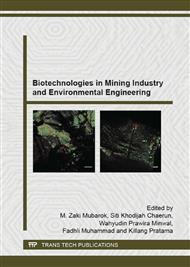p.606
p.610
p.614
p.618
p.623
p.627
p.631
p.635
p.640
Potential for Conversion of Waste Platinum Group Metals in Road Dust into Biocatalysts for Cracking Heavy Oil
Abstract:
The oil industry increasingly exploits ‘heavy oils’ which are highly viscous and difficult to extract in a ‘clean’ way. Heat and ‘cracking’ catalysts facilitate extraction e.g. by applying the ‘Toe-to-Heel Air Injection’ (THAI) and ‘Catalytic Process In-Situ’ (CAPRI) techniques. Cracking catalysts include palladium. Use of Pd-catalyst is uneconomic but by using palladium deposited on bacterial cells (in combination with other PMs) a waste can be turned into a valuable product. Road dusts contain precious metals (PMs) which arise from automotive catalytic converters. Once washed from roads the PMs are dispersed to the environment. Model r oad dust solutions were produced to simulate acid leaching of road dust to solubilise the PMs. Bacteria cannot directly recover PMs from acidic leachate but by lightly depositing Pd(0) ‘seeds’ enzymatically the resulting ‘bio-Pd’-catalyst accumulates PMs from waste model leachate. The bio-catalyst was assessed in the reduction of heavy oil viscosity compared to a commercial catalyst, achieving this reduction with significantly less coke formation, which was not attributable to the biomass component alone.
Info:
Periodical:
Pages:
623-626
DOI:
Citation:
Online since:
November 2015
Authors:
Price:
Сopyright:
© 2015 Trans Tech Publications Ltd. All Rights Reserved
Share:
Citation:


